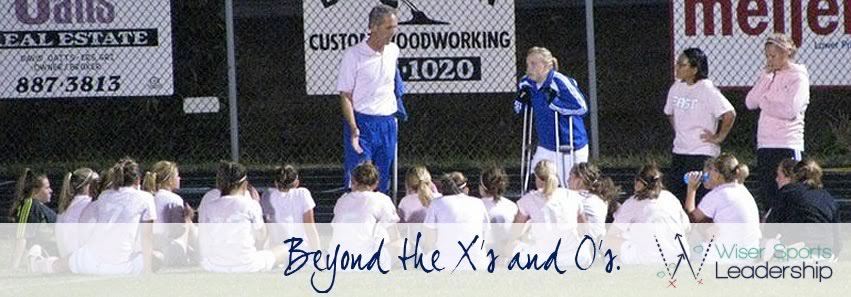MISTAKES……….WE ALL HAVE TO MOVE ON
DeAngelo Wiser
I’ve made a lot of mistakes over my career, but the great thing about it is, I’ve learned from every one of them. It’s how we all learn–through experience. Simply said, if you aren’t making mistakes, you’re not trying to do something new and challenging.
Our players are the same way. They make mistakes throughout a game. As coaches, we can usually trace unfavorable performances to a series of mistakes over the course of a game. You just hope that one of them isn’t the obvious deciding factor in a game.
NEVER LET A MISTAKE BREAK YOUR SPIRIT………..
We were in the final eight of the state playoffs, doing our best to break through to the final four, where we had never been. Our path had been cleared, no perennial powerhouse in our way as in previous years. Our opponent was an excellent team, ranked in the top 10, but a mental roadblock had been lifted from our players’ minds when our more feared adversary lost. This would be our best chance at achieving our goal.
We lost our goalkeeper in a freak accident before the playoffs began, but we didn’t lose a step as we captured the district and regional titles. One of our field players, who also played softball, stepped in the frame. She was doing an excellent job, although lacking the decision making experience we needed this time of year in big games. That concerned me.
What a great match up this game turned out to be. They were pushing forward with numbers and attacking our goal, and we were counter attacking with our speed. On one of their runs they sent a ball into a crowded box. Naturally our new keeper wanted to hug her line rather than go to the ball. When that happened one of our defenders tried to clear the ball out, but her body was angled toward the goal, and when she didn’t get her hips turned, she knocked it in the goal. Our team looked on in disbelief. The player hung her head and was in tears.
But there was still time left in the first half, no time to get down or dwell on what we couldn’t control at this point. We had to regroup, refocus and play on. That would be easier said than done. For the next few minutes the halftime horn couldn’t sound quickly enough. After defending out-of–our-mind for the remainder of the half, we escaped with the score still 1-0.
I did the best I could to console and let our player know that she had done all she could, and we needed her focused for the second half to pull this game out. Her teammates did the same. We talked about areas we could exploit the next half, and what we could improve on.
The second half was tremendous for us. We did all we could to score, and our defenders kept them out of the goal. However it wouldn’t be enough as the score ended up 1-0. After the game I did my best to talk with our team, consoling each player, and especially our player who had made the mistake, explaining that we wouldn’t even have been in this game without her, but I knew it wasn’t enough.
Nothing you can say can make the pain and realization go away. I’m thankful this particular player had a strong family who could handle this in a positive and loving manner.
In our game, mistakes happen in rapid fire succession. Some players pause or get frustrated, and, by the time they snap back, the ball is gone and the chance to win it back has disappeared. It’s not the mistake that’s crucial, it’s how you deal with it that’s important. The sooner you can let the mistake go, and refocus on what needs to be done next, the sooner you’ll be successful. Great players do this automatically.
I once heard the analogy of a fighter pilot who, while flying missions, barely clipped some small trees, causing no damage. Traveling at tremendous speed, he had no time to dwell on that situation because it was gone and now other obstacles and challenges were in front of him. If his focus had been on that mistake, he surely would have crashed.
As coaches we have to teach our players how to deal with mistakes.
1. Mistakes are a natural part of any game.
2. Don’t take mistakes personally.
3. Getting frustrated hurts you and your team.
4. Showing frustration helps the opposition.
5. There’s no time to dwell on mistakes during a game.
6. Play thru the mistakes as if they never happened.
7. React immediately in a determined manner and move on.
8. Talk positively to yourself.
9. After the game evaluate your performance.
What about the coach on the sideline? Have you witnessed a game in which the goalkeeper gave up an easy chance, the other team scored, and the coach lost his or her composure? When that happens we forever alter the path that our players take. Some may leave the game entirely, while others will always want to play it safe and never take chances for fear of your or another coaches’ wrath. We need to recognize those situations and do our best to control our emotions.
How can we improve our reaction to mistakes as coaches:
1. Players are the first to know they made a mistake. They don’t need a loud reminder.
2. Be aware of negative body language on the sideline. Throwing your hands in the air, putting your hands in your face, or simply refusing to look their way says more than any words could ever say.
3. Encourage your players, even if it’s tough in a difficult situation. They need your support then more than ever.
4. If possible, don’t pull them immediately out of the game. It magnifies the mistake and situation. If you feel you must make a change, try to do it after several minutes when the mistake has died down.
5. When you have the time to talk with them, let them tell you what happened before you say anything. I guarantee they knew the right thing to do, but just didn’t do it.
6. If it’s a traumatic mistake or a game winner for the other team, show your support in a caring manner. There are no magic words in those situations. They need to know you still believe in them.
When you watch successful teams, you soon notice that the ability to play through mistakes is obvious. On some nights the mistakes are more numerous than others, but their demeanor and mission is the same–to stay focused on winning the ball and the game.
As coaches, we have control over our players’ reaction to mistakes. We often lose sight of this vital aspect of the game in a rush to work on technique and tactics in practice. Take the time today to stop play when a situation presents itself in which a player reacts positively to a mistake. The picture you paint may make a difference in your season.
I wish you and your team the best!

